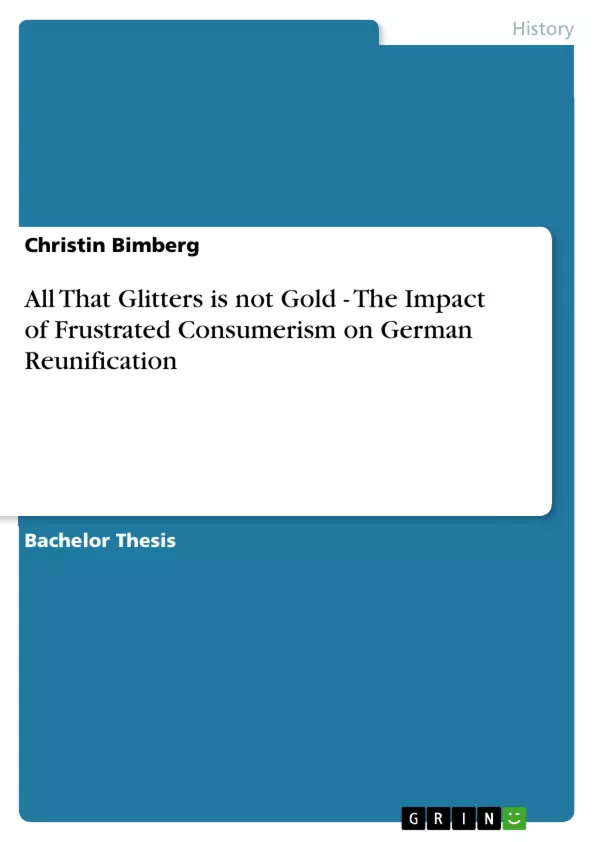Since the beginning of modern nationhood, nationalism has been an important factor in building a nation. According to Ernest Gellner, “nations are the artefact of men’s convictions and loyalties and solidarities.” Nations are thus of big importance for people’s identity. After World War II, the notion of nationalism became a complicated concept for most Germans. One reason was that people who were nationalistic were condemned by others because of the horrible things done by the Hitler regime. Another complication with post-World War II German nationalism was the division of Germany itself. Due to that division, Germans with the same history and culture were divided by political boundaries. Gellner argues that this harms nationalism immensely. Yet most Germans did not see the division as a permanent condition. The East German attitude in this matter is especially interesting. Despite minor changes in opinion over time, the ordinary East German citizen felt that he or she was part of a single German nation. Actions taken by the East German government aimed at full independence and even isolation from West Germany. However, East Germans did not go along with this. They expressed their desire for a single German nation in many fields, one of them consumer culture. The population did not support the official policy of rejecting and ignoring West German and other products but wanted to be able to enjoy the Western lifestyle. This frustrated desire combined with the shortcomings of production and supply in the GDR was the final problem that, apart from the breakdown of the Soviet Union and the East German economy, led to the eventual collapse of the German Democratic Republic.
Inhaltsverzeichnis (Table of Contents)
- Introduction
- Historical Background
- Status of Research
- Analysis of the Factors for Reunification
- Legal Issues
- Political Issues
- Economic and Social Issues
- Events Leading to Reunification
- East German Reactions to the Fall of the Wall
- Perception of Reunification after the Year 2000
- Conclusion
Zielsetzung und Themenschwerpunkte (Objectives and Key Themes)
This thesis examines the impact of frustrated consumerism on the reunification of Germany, exploring how the desire for Western goods and lifestyles in East Germany contributed to the eventual collapse of the German Democratic Republic (GDR).
- The role of nationalism in shaping German identity following World War II.
- The economic and social disparities between East and West Germany, particularly regarding consumer goods and lifestyles.
- The limitations of the East German planned economy and its impact on public satisfaction.
- The influence of East German consumer demands on political and social unrest, culminating in the fall of the Berlin Wall.
- The historical significance of frustrated consumerism as a catalyst for reunification.
Zusammenfassung der Kapitel (Chapter Summaries)
The introduction lays the groundwork for the thesis, exploring the concept of nationalism in post-war Germany and the unique challenges posed by the division of the nation. It examines the East German perspective on reunification, highlighting the desire for a single German nation despite political differences. The chapter also introduces the role of consumer culture in East Germany and its connection to the eventual collapse of the GDR.
The historical background chapter delves into the division of Germany after World War II, outlining the creation of the Federal Republic of Germany (West Germany) and the German Democratic Republic (East Germany). It discusses the geopolitical tensions of the Cold War and the construction of the Berlin Wall, emphasizing the political, economic, and social conditions that fueled East German dissatisfaction.
The chapter on the state of research analyzes existing scholarship on the reunification of Germany, highlighting the focus on political and economic factors while acknowledging the relative neglect of consumer demands as a driving force. It explores the limitations placed on East German citizens in terms of freedom of speech and access to information, and examines the shortcomings of the East German economy in providing essential consumer goods.
Schlüsselwörter (Keywords)
The main keywords and focus topics of this thesis include German reunification, consumerism, East Germany, nationalism, Cold War, planned economy, social discontent, and the Berlin Wall.
Frequently Asked Questions
What is "frustrated consumerism" in the context of the GDR?
It refers to the unfulfilled desire of East German citizens for Western goods and the Western lifestyle, which contrasted sharply with the shortages and limitations of the GDR's planned economy.
How did consumer culture contribute to the fall of the Berlin Wall?
The population's rejection of official isolationist policies and their desire for a unified German standard of living created significant social unrest, acting as a catalyst for the collapse of the GDR.
What role did nationalism play after World War II?
Nationalism was a complicated concept due to the Nazi regime, yet many East Germans still felt part of a single German nation despite the political division.
What were the economic disparities between East and West Germany?
West Germany enjoyed a market economy with high availability of goods, while the East faced the shortcomings of a planned economy, leading to public dissatisfaction.
Does the thesis address research gaps?
Yes, it highlights that while political and economic factors are well-documented, the specific role of consumer demands as a driving force for reunification has been relatively neglected in scholarship.
- Citation du texte
- Christin Bimberg (Auteur), 2006, All That Glitters is not Gold - The Impact of Frustrated Consumerism on German Reunification, Munich, GRIN Verlag, https://www.grin.com/document/135107



